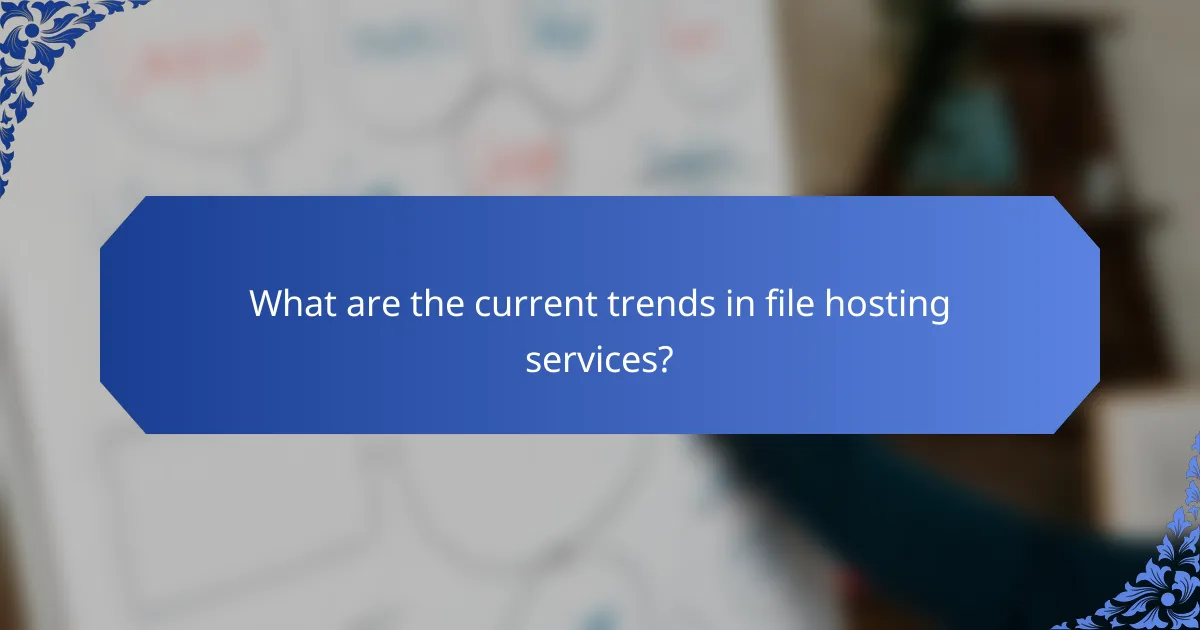File hosting services are evolving to meet changing user demands and technological advancements. Key trends include a heightened emphasis on security and privacy, with many providers implementing end-to-end encryption to safeguard user data. There is a growing need for enhanced collaboration features, allowing seamless file sharing and real-time editing among users. Additionally, cloud storage solutions are expanding, offering scalable options and integration with various applications. The shift towards mobile-friendly interfaces reflects the increasing reliance on mobile access, while innovations like artificial intelligence for file organization and decentralized storage solutions enhance user experience and data security. Overall, these developments highlight the importance of user-friendly designs, increased storage capacity, and cost-effectiveness in the future of file hosting services.

What are the current trends in file hosting services?
Current trends in file hosting services include increased focus on security and privacy. Many providers are implementing end-to-end encryption to protect user data. Additionally, there is a growing demand for collaboration features. Users want seamless sharing and editing capabilities for files. Cloud storage solutions are also expanding, with providers offering more scalable options. Integration with other applications is becoming essential for users. Furthermore, there is a shift towards offering more mobile-friendly interfaces. Providers are optimizing their services for mobile access and usability. These trends reflect evolving user needs and technological advancements in the industry.
How are user preferences shaping the evolution of file hosting services?
User preferences are significantly shaping the evolution of file hosting services. Increasing demand for user-friendly interfaces drives providers to simplify navigation and improve accessibility. Enhanced security features are prioritized as users express concerns over data privacy. Users also favor services that offer seamless integration with other platforms and applications. Mobile accessibility has become essential, as a growing number of users require file access on smartphones and tablets. Users increasingly prefer flexible storage options, such as tiered pricing plans that accommodate varying storage needs. The trend towards collaboration tools reflects user preferences for sharing capabilities within file hosting services. Services that adapt to these preferences are more likely to gain market share and retain users.
What features do users prioritize in file hosting platforms?
Users prioritize security, ease of use, storage capacity, and sharing options in file hosting platforms. Security features like encryption and two-factor authentication are crucial for protecting sensitive data. Ease of use ensures users can navigate the platform without difficulty. Ample storage capacity allows users to store large files or numerous documents. Sharing options, including link sharing and collaboration tools, enhance user experience by facilitating file distribution. According to a 2022 survey by TechRadar, 78% of users rated security as the most important feature, followed by 65% prioritizing ease of use.
How is the demand for mobile accessibility impacting file hosting services?
The demand for mobile accessibility is significantly impacting file hosting services. Providers are increasingly optimizing their platforms for mobile devices. This optimization includes responsive design and mobile-friendly interfaces. Enhanced mobile accessibility improves user experience and engagement. According to a report by Statista, over 50% of global web traffic comes from mobile devices. File hosting services that cater to this trend attract more users. Additionally, mobile accessibility features such as cloud synchronization and offline access are becoming standard. These features allow users to access files anytime and anywhere. As a result, file hosting services are evolving to meet these mobile demands.
What role does security play in the future of file hosting services?
Security is crucial in the future of file hosting services. It ensures user data protection against breaches and unauthorized access. As cyber threats evolve, robust security measures are essential. Encryption, multi-factor authentication, and regular security audits are becoming standard practices. According to a 2022 report by Cybersecurity Ventures, cybercrime costs are expected to reach $10.5 trillion annually by 2025. This highlights the need for enhanced security in file hosting. Users demand assurance that their sensitive information is safe. Therefore, companies investing in advanced security technologies will likely gain a competitive edge.
What security measures are essential for file hosting services?
Essential security measures for file hosting services include data encryption, user authentication, and regular security audits. Data encryption protects files during transfer and storage. This ensures that unauthorized users cannot access sensitive information. User authentication mechanisms, such as two-factor authentication, add an extra layer of security. Regular security audits help identify vulnerabilities and ensure compliance with security standards. Implementing these measures reduces the risk of data breaches and enhances user trust. According to a study by the Ponemon Institute, organizations that prioritize security measures experience 50% fewer data breaches.
How do users perceive the importance of data privacy in file hosting?
Users perceive data privacy in file hosting as critically important. A significant number prioritize their personal information security. According to a survey by NortonLifeLock, 81% of users express concern about data breaches. This concern drives their choice of file hosting services. Users often prefer platforms with strong privacy policies. They seek transparency regarding data handling practices. Additionally, many users avoid services with a history of data leaks. This indicates a clear link between user trust and data privacy measures. Overall, users view data privacy as essential for their online safety.

What innovations are emerging in file hosting services?
Emerging innovations in file hosting services include enhanced security measures, such as end-to-end encryption. This ensures that only authorized users can access files. Another innovation is the integration of artificial intelligence for automatic file organization and retrieval. AI can analyze user behavior to suggest relevant files.
Cloud storage providers are also adopting decentralized storage solutions. This approach increases data redundancy and reduces the risk of data loss. Additionally, many services are implementing advanced collaboration tools. These tools allow multiple users to edit documents in real-time.
File hosting services are increasingly focusing on user-friendly interfaces. Simplified navigation enhances user experience and accessibility. Furthermore, the rise of mobile-first designs caters to the growing demand for mobile access. These innovations align with user needs for security, efficiency, and convenience.
How are advancements in technology influencing file hosting services?
Advancements in technology are significantly influencing file hosting services by enhancing storage capacity and improving accessibility. Cloud computing technology allows for virtually limitless storage options. This enables users to store vast amounts of data without physical limitations. Additionally, faster internet speeds have improved upload and download times, making file sharing more efficient.
Artificial intelligence is also playing a role in organizing and managing files. AI algorithms can automatically categorize and tag content, streamlining user experience. Moreover, advancements in encryption technology are enhancing data security. This is crucial as users increasingly prioritize privacy and protection of sensitive information.
Furthermore, integration with mobile applications is becoming standard. This allows users to access files from anywhere, increasing convenience. According to a report by Statista, the global cloud storage market is projected to reach $137.3 billion by 2025, highlighting the growing reliance on these services. Overall, technology is driving innovation and shaping the future landscape of file hosting services.
What new technologies are being integrated into file hosting platforms?
New technologies being integrated into file hosting platforms include artificial intelligence and machine learning. These technologies enhance data management through improved search capabilities and automated organization. Blockchain technology is also being adopted for enhanced security and transparency. Additionally, cloud computing advancements enable more efficient storage solutions. Integration of end-to-end encryption ensures user privacy and data protection. Furthermore, mobile optimization is improving user accessibility across devices. These innovations reflect the growing demand for secure and efficient file hosting solutions.
How is artificial intelligence enhancing file hosting services?
Artificial intelligence is enhancing file hosting services by improving data organization and retrieval. AI algorithms analyze user behavior to optimize file categorization. This leads to faster search results and easier access to files. Additionally, AI enhances security through advanced threat detection. Machine learning models can identify unusual patterns indicating potential breaches. Furthermore, AI automates file backup processes, reducing the risk of data loss. According to a report by MarketsandMarkets, the AI in file hosting market is expected to grow significantly, reflecting its increasing importance.
What are the implications of cloud computing for file hosting services?
Cloud computing significantly enhances file hosting services by providing scalable storage solutions. It allows users to store and access files over the internet rather than on local devices. This shift enables greater accessibility from various devices and locations. Cloud computing also improves data redundancy and backup capabilities. Many cloud providers implement automatic backups to protect against data loss. Additionally, cloud services often offer robust security measures, such as encryption and multi-factor authentication. According to a report by Gartner, the global public cloud services market is expected to grow by 23% in 2021, indicating increasing reliance on cloud solutions. This growth reflects a trend towards more efficient and flexible file hosting options.
How does cloud technology improve file storage and sharing?
Cloud technology enhances file storage and sharing by providing scalable, accessible, and secure solutions. It allows users to store large amounts of data without physical limitations. Users can access files from any device with internet connectivity. This flexibility supports remote work and collaboration. Cloud services often include automatic backups, reducing the risk of data loss. Additionally, they offer advanced security features like encryption and access controls. According to a 2021 report by Gartner, 94% of enterprises experienced improved security after migrating to the cloud. This demonstrates the effectiveness of cloud technology in enhancing file management.
What challenges do cloud-based file hosting services face?
Cloud-based file hosting services face several challenges. Security risks are significant due to potential data breaches. According to a report by McAfee, 21% of cloud users experienced a data breach in 2020. Compliance with regulations like GDPR is complex and often costly. Users also face issues with data transfer speeds, which can hinder productivity. Additionally, service reliability is crucial; downtime can lead to loss of access to important files. Lastly, competition in the market leads to pressure on pricing and service offerings. These factors create a challenging landscape for cloud-based file hosting services.

What are the evolving user needs in file hosting services?
Evolving user needs in file hosting services include increased storage capacity, enhanced security features, and improved collaboration tools. Users demand larger storage options to accommodate growing data volumes. They seek robust security measures to protect sensitive information from breaches. Enhanced collaboration tools are necessary for seamless teamwork among remote users. Additionally, users expect intuitive interfaces for easier navigation. Mobile accessibility has become crucial as more users rely on smartphones. Integration with other applications is increasingly important for streamlined workflows. Lastly, cost-effectiveness remains a key consideration for users evaluating file hosting options.
How are collaboration features changing user expectations?
Collaboration features are significantly altering user expectations by enhancing real-time interaction and seamless communication. Users now anticipate instant feedback and updates during collaborative tasks. Features like document sharing and simultaneous editing have become standard. These tools promote efficiency and reduce project turnaround times. A study by McKinsey found that productivity improves by 20-25% in organizations using collaboration tools. Additionally, users expect intuitive interfaces that simplify teamwork. As a result, the demand for integration with existing software is increasing. Overall, collaboration features are reshaping how users approach teamwork and project management.
What tools are essential for effective collaboration in file hosting?
Essential tools for effective collaboration in file hosting include cloud storage services, real-time editing software, and communication platforms. Cloud storage services like Google Drive and Dropbox allow users to store and share files easily. Real-time editing software such as Microsoft Office 365 enables multiple users to work on documents simultaneously. Communication platforms like Slack facilitate discussions and updates regarding shared files. These tools enhance teamwork and streamline workflows. According to a study by McKinsey, effective collaboration can boost productivity by up to 25%.
How do users assess the effectiveness of collaboration features?
Users assess the effectiveness of collaboration features through user feedback and usage metrics. They evaluate how well these features facilitate communication and task completion. Key indicators include the frequency of use and user satisfaction ratings. Surveys and interviews provide qualitative data on user experiences. Metrics such as response time and resolution rates also indicate effectiveness. Research shows that 70% of users prefer platforms with seamless collaboration tools. This data highlights the importance of effective collaboration in user retention.
What factors contribute to user satisfaction in file hosting services?
User satisfaction in file hosting services is influenced by several key factors. These factors include reliability, speed, ease of use, and security. Reliability ensures that users can access their files whenever needed. Speed affects how quickly files can be uploaded or downloaded. Ease of use relates to the interface and overall user experience. Security encompasses data protection measures against unauthorized access. According to a study by Statista, 70% of users prioritize security features when choosing a file hosting service. Additionally, customer support responsiveness plays a crucial role in user satisfaction. Users appreciate timely assistance for any issues encountered.
How does customer support impact user experience with file hosting services?
Customer support significantly impacts user experience with file hosting services. Effective customer support resolves user issues quickly, enhancing satisfaction. Users often encounter technical challenges or need assistance with features. Prompt responses from support teams reduce frustration and downtime. A study by Zendesk found that 67% of consumers cite bad experiences as a reason for churn. Additionally, positive interactions with support can foster loyalty and trust in the service. This relationship underscores the importance of reliable customer support in retaining users and improving overall experience.
What role does pricing play in user satisfaction with file hosting platforms?
Pricing significantly influences user satisfaction with file hosting platforms. Users often associate pricing with perceived value. Competitive pricing can enhance user acquisition and retention. A study by Capterra found that 70% of users consider cost as a primary factor in their satisfaction. Affordable plans lead to higher satisfaction levels, as users feel they receive good value for their investment. Conversely, high pricing can deter potential users and result in dissatisfaction among existing users. Users also appreciate transparent pricing structures without hidden fees. Overall, pricing plays a crucial role in shaping user perceptions and experiences with file hosting services.
What best practices should users follow when selecting a file hosting service?
Users should evaluate file hosting services based on reliability, security, and features. Reliability ensures that files are accessible without interruptions. A study by Statista shows that 99.9% uptime is standard for reputable services. Security is crucial for protecting sensitive data. Look for end-to-end encryption and compliance with regulations like GDPR. Features should include user-friendly interfaces, file sharing options, and integration capabilities with other tools. According to a survey by TechRadar, 70% of users prioritize ease of use when selecting a service. Finally, consider customer support availability. Responsive support can resolve issues quickly, enhancing user experience.
The main entity of this article is file hosting services. It explores current trends such as enhanced security and privacy measures, the increasing demand for collaboration features, and the importance of mobile accessibility. The article also examines how user preferences are shaping these services, highlighting key attributes like security, ease of use, and storage capacity. Additionally, it discusses emerging innovations, the impact of cloud computing, and the significance of customer support and pricing in user satisfaction. Overall, the content provides a comprehensive overview of the evolving landscape of file hosting services and the implications for users and providers alike.
